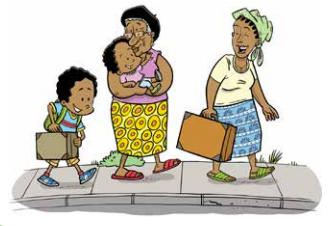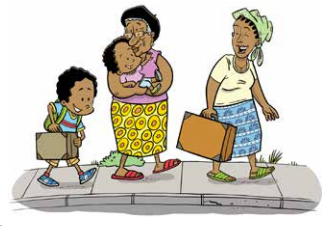Celebrate world read aloud day in February, and beyond!

Source: Reading aloud as intangible cultural heritage: A German initiative to support literacy, reading and libraries – worldwide Klaus U. Werner Philologische Bibliothek, Dept. of Humanities, Freie Universitaet, Berlin, Germany klaus.werner@fu-berlin.de
As a parent or caregiver, a proud aunt or uncle, doesn’t this resonate with you? Doesn’t it take you back to your own childhood, when you were read to, or when you were sitting with family listening to their stories being told? Stories that are now yours to tell…
Because we don’t do it enough anymore and because we need a reminder, Wednesday, 3 February is World Read Aloud Day. Once again, South African non-profit organization, Nal’ibali has put together an exciting programme to celebrate the event and to join the global campaign to promote an ongoing culture of reading and storytelling.
This year, its goal is to achieve a read-aloud record by reaching three million primary school children through a dedicated read-aloud story session, with the option to share the experience and photos on social media, using the hashtag #MyWrad2021. If you haven’t pledged yet, there is still time.
Your pledge is simply a commitment to read a story out loud to the special children in your life. If you don’t have access to any age-appropriate books, Nal’ibali has commissioned a beautiful new story which can be downloaded free from their website, or you can have sent to you via WhatsApp.

Caption: Fly, Everyone, Fly – a story about the power of imagination and dreaming – was written by Sihle Nontshokweni with illustrations by Magriet Brink and Leo Daly, and is available in 11 languages.
Find the pledge details and story here.
Nal’ibali developed its World Read Aloud Day programme in conjunction with the Project for the Study of Alternative Education in South Africa (Praesa), a non-governmental organization focused on multilingual early childhood language and literacy development.
Talking about why reading aloud in the early years is crucial, Arabella Koopman, the programmes director at Praesa, recently said in an article in the Mail and Guardian: ‘Opportunities to play and imagine, listen to, think and talk about stories and books all contribute enormously to young children’s language growth and are the vital foundations of their literacy learning.’
Koopman goes on to explain Praesa’s supporting role in Nal’ibali’s campaign, with the development of an easy-to-follow guide to show parents and caregivers ‘how to bring life to the story, and how to help children connect personally and imaginatively with the story’.
The guide will be distributed along with the story, whether it’s received digitally or as a hardcopy. Nal’ibali has also created tip sheets that detail not only why reading aloud is important, but also ideas for storytelling activities and some insight on how to choose books.
And this is one of my favourite things about the campaign; ostensibly, yes it’s about early literacy and reading aloud, but it doesn’t assume it’s something, as adults, we do naturally or with ease.
These are some of my favourite bits of wisdom, that can be found in the tip sheets:
- Reading aloud with children is known to be the single most important activity for building the knowledge and skills they will eventually need for learning to read.
- Find ways to draw them into the story as you read. For example, ask them what they think might happen next, discuss one of the pictures or ask them to turn the pages for you.
If you can’t remember when last you read out loud for your own joy and pleasure or to surprise and delight a child, you might be feeling a bit rusty – again, Nal’ibali has come to the rescue with its wonderful ‘how to guides’. Sure, it sounds simple enough, but here are just two insightful tips worth remembering:
- Reading aloud is always a performance! Put lots of expression in your voice to create the mood!
- Start by reading the name of the author (and illustrator) so children appreciate that books are created by people just like them!
It’s definitely worth finding books that are representative of the children you’re reading to, with illustrations that they can identify with and in a language that is familiar to them, whether the story is told in English, or even better, in the child’s mother tongue.
Having said that, keep an eye out for World Mother Tongue Day on 21 February, 2021 for even more interesting information.
If you’re keen to make every day a read aloud day, but you’re not sure where to start, there are some amazing openly licensed resources listed below.
In addition to Nal’ibali’s extensive library, Ubongo also has a number of resources that support reading aloud, including its free Read with Akili apps featuring interactive stories in multiple languages that families can read together, as well as what’s available on their YouTube channel. Ubongo also has a selection of print it yourself mini-books that can be downloaded and printed, as well as a number of eBooks in various languages available for free on Worldreader, or the Ubongo toolkits platform.
Book Dash storybooks can be found here, and if you’re looking for more reading aloud inspiration, you can listen to their children’s book authors reading their own stories on the Let’s Read with Book Dash YouTube channel.
Here are some links to find openly licensed storybooks and reading resources that can be read aloud in some of the 7,000 living languages:
• Room to Read South Africa's storybooks
• Room to Read’s Peace and Equality collection




